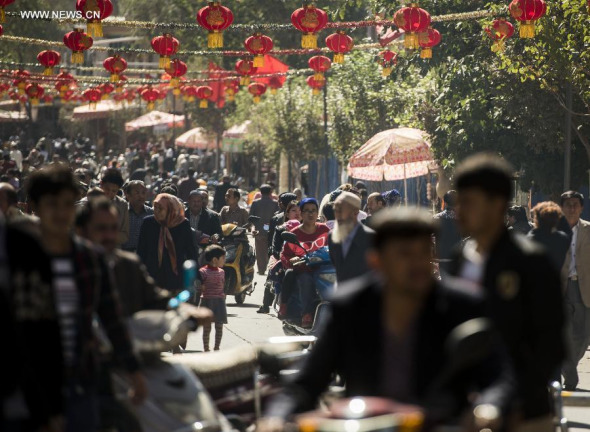
Local residents shop in a bazaar in Kashgar, northwest China's Xinjiang Uygur Autonomous Region, Sept. 23, 2015. Local Muslims prepared for the upcoming Corban Festival holiday, also known as Eid al-Adha or the feast of the sacrifice, in various ways. Kashgar, the westernmost city in China, was the center of Uygur civilization for centuries, a place where people came together to trade and spread Islamic learning, on the caravan routes from Europe and Persia to China. (Photo: Xinhua/Jiang Wenyao)
Since Thursday, millions of Muslims across the globe have been celebrating Eid al-Adha, or the Feast of the Sacrifice. Some went on the hajj pilgrimage to Mecca, Saudi Arabia, while others marked the festival in their own unique ways.
Thousands gathered early Thursday morning at Yanghang Mosque in downtown Urumqi, capital of northwest China's Xinjiang Uygur Autonomous Region, for prayers to observe the major Islamic festival. There are around 24,000 mosques in Xinjiang, where the majority of 10 million people identify as Muslim.
Yasen Wupur, 32, from south Xinjing was one of the faithful. He bought a lamb for the traditional feast for 700 yuan (110 U.S. dollars), nearly half of his monthly salary.
"Last year I had just relocated and could not afford a lamb," said Yasen, "I am so happy I was able to this year."
While Yasen and his wife and two kids were eating their meal, however, a tragedy had befallen their religious brothers and sisters thousands of miles away.
At least 717 pilgrims were killed in a stamped near the holy city of Mecca, the worst tragedy to strike the annual hajj pilgrimage in more than two decades.
"It was heartbreaking," said Yasen, who has long dreamed of going on the hajj. More than 3,000 people from Xinjiang go on the hajj every year.
Meanwhile, in Eleonas refugee reception center on the outskirts of Athens, Greece, kids from Syria and Afghanistan were making soap bubbles with two sticks and a rope, seemingly without a care in the world.
A big meal was served on Thursday noon and a show was put on for the 720 refugees, who have made makeshift homes in 100 shipping containers.
Mohammed Amin, from Afghanistan, lamented the pain of being separated from his family during this important time.
"If it was not for the war, we would be with our relatives. We would be very happy," said Amin, who undertook a treacherous two-month journey to get to Athens.
On the way from Turkey to Greece's Lesbos Island, Amin lost 500 U.S. dollars, all the money he had in the world, and all his winter clothes.
"We are not in the best mood for a celebration, but my wife and I try to be happy, for the sake of the kids," said Amin, who hopes to settle in Germany.
For million of displaced Syrians in Lebanon, Turkey and across Europe, Eid al-Adha is tinged with sadness.
Amal, an elderly Syrian woman at a refugee camp in Lebanon, was looking over photos of her three sons and could not stop the tears from flowing.
"Another Eid al-Adha in poverty and misery," said Amal, who will spend the holiday alone.
Her three sons are trying to get to Europe. "I don't even know if they are alive or not," she said.
"Unless peace is restored in Syria, Eid al-Adha is meaningless to us," said another Syrian refugee who gave his name as Rifi. He had lost a son in the Syrian war.
Yawuz Selim, a businessman from Turkey who works in Urumqi, reflected on the plight of the Syrian refugees.
"When a country cannot protect its citizens, and exposes them to war, tragedy is bound to happen," he said.
China has more than 20 million Muslims, who mainly live in the western regions, including Xinjiang, Qinghai, Gansu and Ningxia. These areas enjoy a three-day Eid al-Adha holiday during which the highway-toll fees are not collected.
Ayixa Jumale, a Kirgiz herdswoman in Akto County, south Xinjiang, spent her last Eid al-Adha holiday at her sister's house as the government ruled that her dilapidated stone-and-mud house was not fit to live in.
With a 24,000 yuan government grant, the 70-year-old woman was able to build a 60-square-meter brick and concrete house, where she will be for Eid al-Adha this year.
"Never in my whole life had I dared to imagine that I would be celebrating Eid al-Adha in a new house," she said.
The 60th anniversary of founding of Xinjing Autonomous Region is on Oct. 1.


















































